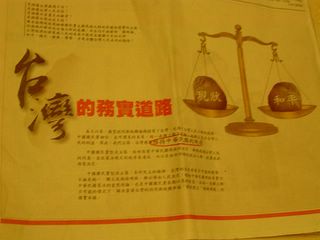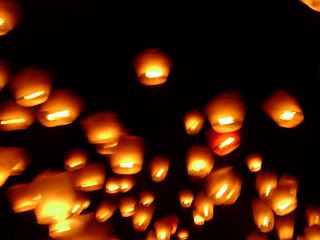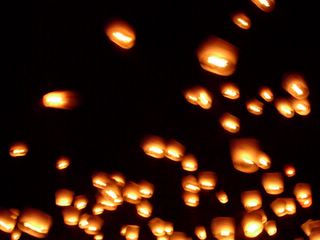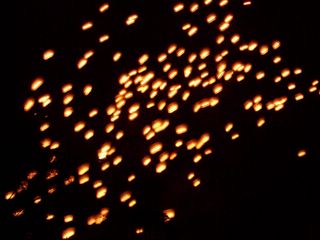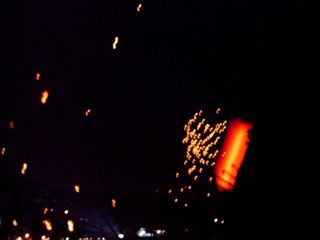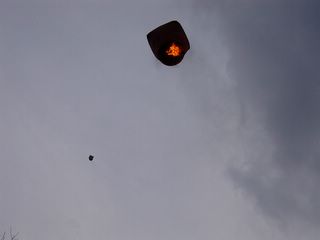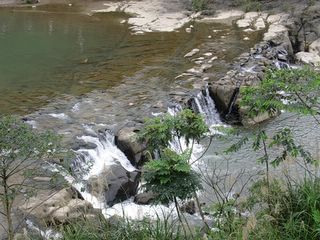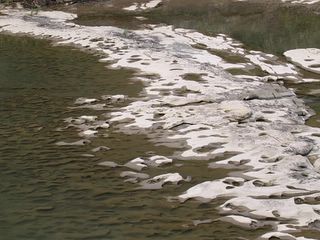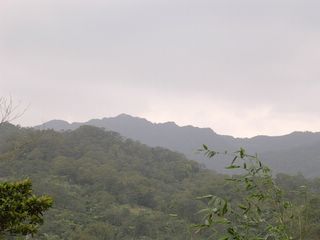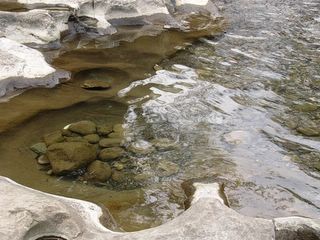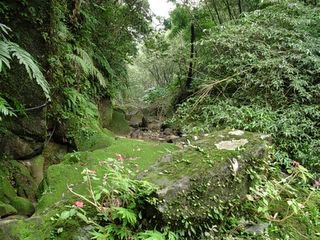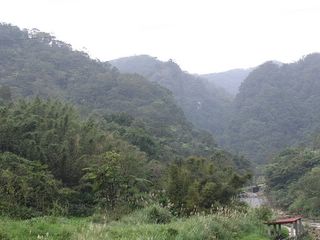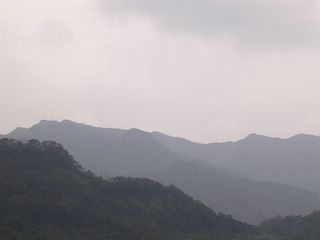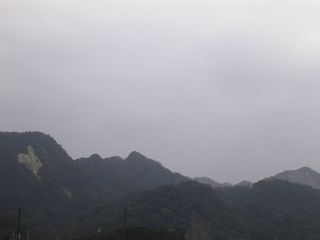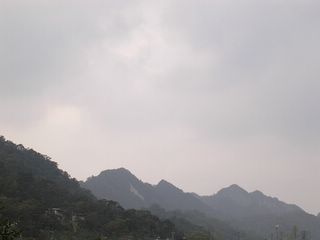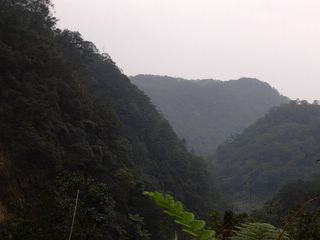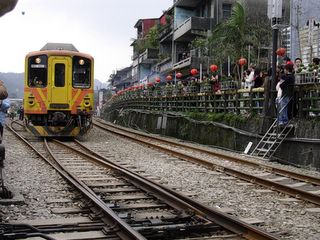Saturday, February 18, 2006
Twenty-two today...unofficially
Well, according to the lunar calendar, I'm that.
My 'official' birthday is not until the 21st!
The check up
I woke up especially early today, and was already awake when mum and dad were talking outside. I couldn’t hear what they were saying, but I knew, because I asked, that today’s was dad’s monthly check-up at the hospital.
I waited until dad left the house, and then I woke up, quickly showered and dressed myself. And I rushed to the hospital, to find dad sitting in the basement refectory, eating alone. I bought some egg rolls and soya bean milk and appeared before him, smiling as I did so. “Good morning!”
Dad was surprised, pleasantly perhaps, and I could see him smile. We sat at the table, didn’t say much, but for a few moments there was a bond, and perhaps he could feel it too.
I accompanied him up and down, and waited together with him. Then suddenly, outside the metabolism ward, dad told me to go home. Privacy, he said, and he didn’t want me to be around because he has a right to privacy, and I was about to infringe on that. He’s right, but I was hurt. All I wanted was be with him, know what his state of health is, and be there, as the doctor ordered, as a show of moral support. But dad turned me away.
“There may not be another time”, I said firmly, but inside I was hurting. “Once I go off to study, I may not be back for a long time”.
I respect privacy, and will defend mine if necessary, but do I, as a son not have a right, even if it’s just from a sense of care and love for a close one, to know what is going on? When it comes down to it, I’ll get to know it anyways, sooner or later. I just don’t want to know and be faced with it when it’s 'too late'...
On the way home, I was alone. I felt like crying, running into my room and just crying to sleep. What am I doing here, at home, in Taiwan, if not to spend more time getting to know my dad? I could have plenty of opportunities elsewhere, working, getting experience, and getting paid. But I chose to stay on because I want to use my spare time, while I still have it, doing something meaningful and close to heart...
But then I realised, and then it came to me, that this was just a fleeting moment, as fleeting as the emotions I felt...
Friday, February 17, 2006
The state of Taiwan
democracy. The national identity crisis, whether you identify yourself as Chinese or Taiwanese, has the potential to erupt and divide the country in two opposing and extreme camps, which may serve to further undermine the search for cooperation and consensus necessary for nurturing a new political system, and for breaking away from the old corrupt and "guanxi"-based top-down mannerisms. Has the handover of power from the pro-China KMT to the pro-Taiwan DDP brought about real benefits?
As an outsider, as someone who admittedly does has not lived in Taiwan for more than a few months at each time for the past fifteen years, but as someone who cares deeply about developments of his native country, there have been noticeable differences. The north-south divide has definitely been shortened. Events like National Day, or even the Lantern Festival are now organised in cities other than just Taipei, something that would have been inconceivable years ago. Taiwanese, as a language and culture, is no longer shunned aside and displayed only on the sidelines, but is encouraged and promoted. School children now must learn and another 'mother tongue' next to the official Mandarin. The diversity of cultures and languages (Chinese, Taiwanese, Hakka and aboriginese) have finally been recognised in various policies promoting "unity in diversity". TV and radio stations, designated protection reserves and tourism have all helped to uplift the previously suppressed status of the vast majority of people under the veil of "everyone is Chinese.
But these are just a few 'on-the-surface' examples of the improvements in the past few years. How much have the lives of people really improved? Open up the predominant proportion of broadsheet newspapers in Taiwan, and there are articles and pictures abundant with negative reporting and criticisms about the government and establishment. Can this simply be attributed to the dominance of the pro-KMT think-alikes in the media? Can this simply be balmed on the public's desire for sensationalist news and gossip and thirst for scandals and 'exclusives'? Or has the general state of social, political and economic stability and prosperity gone really downhill ever since the new government took over?
I'd like to give the current government the benefit of the doubt. Perhaps, as in all 'chinese' cultures and societies, the traditions of 'friends and family first', "guanxi", 'and mutual back-scratching' is prevalent, yes. And perhaps some elections promises and slogans are intended to sway voters and win sympathies. But really, how easy is it to reform something, someone, let alone an entire organisation of state, society and people that have been under the monopoly dictatorship of one authoritarian party sanctioned by the repression and fear-mechanisms of the military and police? I'd like to think the DDP came to power with good intentions and a reform-minded strategy. But reform and change is only effective and possible if the system works in that direction, or better still, is willing to be changed and reformed. Unfortunately, when the entire structure of the way power and economics is organised is itself defunct and achronastic, anything, however well-wishing and well-intending too will be contaminated.
I've come across a few blogs which shed some light on the issue.
One paints a bleak and 'rotten' example of how much Taiwan has gone from bad to worse, and seems to be beyond rescue. The main argument is built on a translation of a respected business-orientated magazine in Taiwan, part of it reads:
"In the past, these people [politicians] in Taiwan are beyond criticism. Those who make criticisms are said to "denigrate Taiwan." In order to "love Taiwan," the media in Taiwan had to keep silent, or even be forced or willingly to praise the leaders. In this silence, Taiwan has the reached the end of the road where Taiwan had managed to denigrate itself. Today, the trust in the leadership, the governability, the economic future and even social attitudes are rapidly disintegrating. When the day comes that the people of Taiwan finally wakes up, Taiwan may have already reached a stage where it no longer matters what people have to say about it.
Thus, in Taiwan today, we are afraid that we have reached a moment when we must seriously confront the problem of "rottenness." The rotting of a country and society could not have happened suddenly, for it must have been a gradual process. The key elements have to be the loss of morality in the political figures, the loss of the sense of right versus wrong, the perversion of the justice system, the existence of double or even multiple standards as well as the terminal financial deterioration. The rottenness also reflects the chaos of anarchy and nihilism among the people, which eroded the complete society. Social accidents and disasters become magnified, small-time thieves become big-time robbers, homicides become major crimes, trains get derailed and airplanes fall down from the sky. Some day, people will find that they want to stay above the fray but that is an impossible dream. From this moment, the road that Taiwan is taking is the path towards "rottenness."
...
There are officials, but no government; there is a society, but no rules; there are media, but no sense of right or wrong. Taiwan is rotting down this path, and is there any other way out other than continuing?"
Then there is this rebuttal, which makes strong and backed-up arguments to the contrary.
Sorry the entries are a few months out of date...but rottenness could have gotten worse, or better since.
UPDATE: 1 MARCH 2006
A sample of the divide of opinions about the state of Taiwan.
UPDATE: 2 MAy 2006
And then there are also articles like this one, which praises Taiwan's uniqueness
Thursday, February 16, 2006
Small Station
It was short, only half an hour long or so, but well written and filmed. Very simple story about a mother and her son watching express trains fly by at a small station (Santiaolin) in the countryside. The son has a slight mental disability, but is (like me) an enthused trainspotter. Only at a small station can you see express trains go by without stopping, and that gives the son a sense of thrill.
The isolation and emptiness of the location, in contrast to the few but warm dialogue between mother and son reveal how pure and human the characters are. Gestures like holding hands while walking, or sitting together and eating lunch are so insignificant but contain such deep emotions and expose the deep bond that exists between mother and son. Now and then, the ever changing clouds and misty landscape cuts through to show the passage of time. And now and then, shots of green towering mountain ranges to add emphasis to the naturalness of it all.
At the station they for most of the time are the only people there. There is a station master, who sits behind old equipments that have to be driven by hand, as well as flashy computer monitors, but he is in the beginning suspicious and even annoyed at the presence of the duo. Perhaps the station master has been alone for so long, the only dialogue being over a communicator to fly-by and the occassional slow trains, and with the few villagers whose name he knows by heart, that he feels disturbed at the sight of a foreign human presence. Certainly, when the son steps so close to the edge of the platform as an express hurtles by gives the stationmaster more reason to become angry. He scolds the mother for the son's dangerous behaviour, but then learns that the duo have no other intentions besides watching the trains go by-- something that he himself does everyday, something that he himself probably has forgotten the thrill of each passing train.
As the express , a long stretch of cold steel with tightly sealed windows and doors, cold LED displays and a blinding headlight , hurtles by the son unexpectedly, and perhaps naively, shouts to the passing train. His hail is barely audible in the background noise of clanking wheels and swishing wind, and perhaps noone in the cold steel carriage hears or notices him, but he continues his call. As the train pulls further away, the son shouts "Goodbye, goodbye, goodbye". His voice reverberates in the mountains, that even playing children, a limping man and the stationmaster himself stop to listen.
Then it is time to head home. The train they board, together with another middle aged woman carrying an old carrier bag made out of stitched green and red fibre that the grandparent generation used, is a slow train. No luxuries and modernities of the express...no air-con, just old green seats sat with passengers engaged in their own mundane activities, open windows and rotating ceiling fans.
As the train pulls away, the station master waves his wand and stands alone again on the platform. A close up short of his face reveals emotions, and perhaps wallowing tears, that are in stark contrast to his hard and sternness before.
Once in Taipei, they are in a different place, one defined by modernity, hardness, crowdedness-- place in progress and motion. They leave behind them that peace and naturalness the moment they board the train, and become lost in the crowd, under the umbrella as simply another couple walking in the rain. But the audience knows better.
The movie reveals the story of forgotten people in a time when the spiritual and material are governed by rapid change and movement, and in a time when human contact and communication is minimal and through a medium. The mother and son are present as if to remind the audience that in the midst of this all, there are those who, perhaps neglected and seen as deviants, are able to live life to the moment, and enjoy simple things and the company of one another. It inspires, perhaps reminds, others like the station master, that those characteristics of seeing and treasuring what is around you should be explored and reflected on.
And the audience should know better too.
Ad trouble
The ad basically says that the KMT supports the status quo which governs relations between China and Taiwan, however adds (and this is the cause of the uproar) that
"...the future of Taiwan has many posssible options, whether it is unification, independence or maintaining the status quo, all should be decided by the people". [translation mine]
It is that "independence" word which has in the aftermaths of the publication of the ad prompted the KMT to defend itself. The KMT (as the previous post suggests) has little regard for the sovereignty of Taiwan or the wishes of the people, since its policy has always been to unify with China. So the "independence" option is something groundbreaking, something even the old guards of the party have leapt up to criticise. So in an attempt to quell the fire, the KMT then reversed its position and said that Taiwan independence is definitely not an option for the KMT.
Shame that for once the KMT seems to have said something right, but then reversed its position again for fear of antagonising/appeasing its core supporters. And that part about respecting the decision of the people is also something new and in the right direction, but is unfortunately being turned back on.
"Bridging the Divide"
The 'untainted' full text can be found here.
--
BRIDGING THE DIVIDE:
A VISION FOR PEACE IN EAST ASIA
A speech by Dr. Ying-jeou Ma, Mayor of Taipei and Chairman of the Kuomintang, at the London School of Economics and Political Science, 13 February 2006
Opening Remarks
Director Davies, Distinguished Members of the London School of Economics and Political Science, Ladies and Gentlemen:
First of all, I would very much like to express my utmost gratitude to
Director Davies for his good offices in making this special occasion possible. As an academic by training myself, I felt quite at home as I stepped into these surroundings. I am especially delighted to be given the opportunity here to share with all of you my deepest commitment to peace and prosperity across the Taiwan Strait, and in the larger Asia-Pacific region and the global community.
In 1895, four leading members of the Fabian Society—Beatrice and Sidney
Webb, Graham Wallas and George Bernard Shaw—decided to create a school named the London School of Economics and Political Science to provide support for their social reformist ideas. Since then, this School has proved to be a world-class teaching institution and a leading research center in social sciences, as well as a platform for disseminating political and economic ideas worldwide.
Ladies and Gentlemen, please allow me to pay tribute to this great School
and its splendid achievements in the past century.
I. The Three Principles of the People in Perspective
A Historical Rendezvous
Also in 1895, in another corner of the world, quite something else transpired,
that is, after the defeat of Qing China by a rising Japan in the first Sino-Japanese War, Taiwan was ceded to Japan under the Treaty of Shimonoseki concluded on 17 April 1895. My party, the Kuomintang, also known as the Chinese Nationalist Party, was founded by Dr. Sun Yat-sen on 24 November 1894, right after China’s defeat but prior to Taiwan’s cession. Prompted by the defeat, Dr. Sun aimed at rescuing China from the corrupt and inept rule of the Qing court and transforming China into an independent, democratic, and prosperous modern state. Eighteen years later, Dr. Sun and his comrades succeeded in founding the first republic in Asia—the Republic of China (ROC)—in 1912.
(And why did China give Taiwan away as a war trophy? Some may argue that China did so under duress, but most likely because at the time,the Qing government thought of Taiwan merely as a place where pirates and barbarians lived, thus not worthy of retaining. Compare this to the attitude of the CHinese today, and their eagerness, regardless of consequences, to get back what they view as theirs. But they gave it away, and ownership was tranfered, so how do you keep on claiming it is yours?
Though undeniably Taiwan had been part of Chinese territory for a decade or so, it was always loosely governed and cared for under the auspices of the province of Fukien.
Perhaps Ma does not know, or does not want to know, that actually the first republic founded in Asia was the Republic of Formosa, founded in 1895 shortly after China gave the island away to Japan. The republic was however short-lived and to my knowledge not recognized by any state (important ones). When the Japanese arrived, the republic was crushed.)
In retrospect, then, the year 1895 saw the founding of the LSE and China’s
cession of Taiwan to Japan. These two seemingly unrelated historic events—may I remind you—intersected because of one great historic figure, namely, Dr. Sun Yat-sen.
The Fabians and Dr. Sun Yat-sen
In 1896, Dr. Sun was kidnapped in London under the Qing court’s order for
his arrest. Thanks to public pressure in Great Britain, and with the help of his medical school professor Dr. James Cantlie, Dr. Sun was released. After that he frequently visited the library of the British Museum to study European politics and political thought, particularly socialism and Marxism. Hardly a secret at all, one of the most important and lasting influences on Dr. Sun’s political thought came from the Fabians.
As is well-known, the Fabians advocated gradual reform and stressed the
importance of rational persuasion and education rather than class struggle. They patiently set out and argued for their case for change and improvement. And their pragmatic approach was always founded on a deep commitment to
democracy and pluralism.
(Compare to the KMT’s commitment to democracy and pluralism in its heydays and in its forty something years of tyranny over Taiwan under Chiang Kai-Shek.)
Indeed, these Fabian insights and foresights not only contributed to the
founding of the London School of Economics and Political Science, but also
exerted a strong influence upon Dr. Sun Yat-sen in formulating his core
philosophy—the Three Principles of the People.
The Three Principles of the People and the KMT
The Three Principles of the People—namely national independence,
political democracy, and social well-being—are the political ideals from which the Kuomintang derives its theoretical foundation. China’s defeat in 1894 prompted Dr. Sun to formulate his “Principle of National Independence” against the Manchu government. His contact with Fabian thought, in part, prompted him to formulate his “Principle of Social Well-being”—which represents a reformist approach to China’s social and economic ills and is a key to Taiwan’s economic miracle in the latter part of the last century. No less importantly, for Dr. Sun and his followers, social and economic improvement must go hand-in-hand with political reform as specified by the “Principle of Political Democracy”.
These political ideals and values, I believe, have lost none of their relevance
today. We have to keep updating them in the much more complex world of late modernity and renewed globalization we’re in. The Kuomintang’s history represents the party’s long struggle to accomplish
the ideals of national independence, political democracy, and social well-being in the Chinese context—first in the Chinese mainland, and after 1949, in Taiwan.
(Establish national independence? Compare this with what Ma says about eventual unification with China. Political democracy? Not when it does not suit party’s interests.)
For more than a century, the party has always been the driving force for Chinese modernization, by leading the Republic of China successively through the “Northern Expedition for National Unification” from 1926 to 1928, the “Golden Ten Years” of national construction from 1928 to 1937, the war against the Japanese invasion from 1937 to 1945, the adoption of a democratic constitution in 1946 and, after 1949, by developing a prosperous and democratic society in Taiwan.
(Praise the KMT for its wonderful works and efforts in the mainland…but if it was so successful, why did it lose power to the Communists? Who were the KMT supporters, but the industrialists and financiers, gangsters and foreigners? The KMT’s reputation as a corrupt and malfunctioning administration dug its own demise as potential regime which could hold China united. The ignoring and loss of peasant support meant the KMT turned its back against the vast majority of Chinese people, in favour of the rich and powerful few. And what of the events in and after February 1947? Or the oppression and murders committed in the 40years of White Terror? You cannot talk about recent Taiwanese history and claim to represent the sentiments of the Taiwanese public by glossing over these events as non-events. To be fair, Ma does mention this later on.
The so-called “democratic constitution” was adopted by party elders purporting to represent the people and provinces of China. Till this day, despite some constitutional amendments, that piece of document exists and governs Taiwan—with all its anachronisms and controversial claims to territory and divisions of political power still in place. So in the constitution it still says the territory of the ROC covers Tibet, Mongolia and all the provinces of the Chinese mainland…BUT it does not expressly mention Taiwan as part of the ROC’s territory. And because of the “democratic constitution”, Taiwan has neither a system of government that is based on the presidential nor the parliamentary system. Hence calls by the opposition parties (Taiwan Solidarity Union and People First Party) to clarify the division of powers along the lines of the cabinet system, in order to check the powers of a seemingly omnipotent yet ‘answerable-to-no-one’ president. Why does President Chen want to amend the constitution before 2008? Because under the KMT nothing was done about the constitution, and nothing will be done about the constitution as long as the KMT are in power.)
II. The KMT’s Governance in Taiwan
Republic of China Thrives on Taiwan
In the pre-1949 period, the Kuomintang directed most of its political
energies into the difficult task of maintaining national independence and
unification. For many reasons, however, the democratic experiment launched by the party in the Chinese Mainland was not completely efficacious. Soon after the end of the war against Japan, the Chinese Communist Party (CCP) quickly expanded its forces, defeated the Nationalists and declared the establishment of the People’s Republic of China (PRC) in 1949 in a state of tremendous economic and social crisis. Consequently, the ROC government was compelled to relocate from the Chinese mainland to Taiwan—which had been returned to the ROC as the result of Japan’s unconditional surrender in 1945. After 1949, the KMT continued to run the ROC government on Taiwan, until the year 2000 when it lost the presidential election to the Democratic Progressive Party (DPP).
(Really, this short account of history in one single paragraph is supposed to give the impression of the ROC thriving on Taiwan? More than anything, it shows the KMT as an autocratic regime and loser.
Taiwan was not returned to the ROC as a result of Japan’s surrender. This is a common misinterpretation of the Cairo Declaration, which was just that: a declaration of intent, and thus has no legal basis in international law. None of the peace treaties with Japan concluded in after the War stipulated who would gain sovereignty over the islands of Taiwan, the Pescadores, Quemoy and Matsu. So, as President Truman rightly said in the 50s, the status of Taiwan is “undetermined”, and still is today.)
Economic Miracle and Social Well-Being
Having learnt from its past experiences, the Kuomintang government in
Taiwan put forward a whole series of economic and social policies according to. Dr. Sun’s “Principle of Social Well-being”. These policies have proved to be highly conducive to economic growth as well as social equity. One of the most salient achievements of the Kuomintang government in Taiwan was that it built an effective “developmental state” with a dynamic market economy having an average 8.1% annual growth rate from 1950 to 1999. Excuse me for indulging in another instance, which I hope might be of some interest to you. We all know since the late 1980’s Taiwan has become the prominent manufacturing base in the global production chain for computers, computer peripherals and IC chips.
(For all the things the KMT has done in the past half a century on Taiwan, credit must be given to its economic development of Taiwan. But then again, Taiwan enjoyed an advantage over many developing countries, in that the Japanese colonial period had provided much of the infrastructure and educated work-force to further development. )
The world’s number one and number two IC foundries, TSMC and UMC, were incubated and spun off from the government-funded ITRI (Industrial
Technology Research Institute) when an LSE alumnus and many thanks to LSE, Mr. Yu Kuo-hwa, was the premier in the KMT government presiding over the success of industrial upgrading in Taiwan.
Indeed, what the KMT government managed to achieve between 1950 and
1999 was no small feat. It was, in 1994, described very aptly by the World Bank as the “East Asian Miracle” along with other top performing economies such as Singapore, South Korea, and Hong Kong in the region.
More remarkably still, Taiwan was one of the very few developing countries
that succeeded in maintaining a delicate balance between economic
development and social equality. For instance, the average household income of the top 20% families in Taiwan was about 5.55 times that of the bottom 20% in 1999, prior to the power transfer from the KMT to the DPP. This was one of the lowest rich-poor gaps among developing, or even among developed, countries.
Unfortunately, though, the economic growth rate has taken a nosedive since
the DPP came into power in 2000. The economic divide within and without in the last few years has widened intolerably.
(A chance to discredit the DDP regime…admittedly the DDP is often incompetent and indecisive, but the whole world economy suffered as a result of a series of major world event shakeups (9-11, war in Iraq), rising oil price, fluctuating markets and generally uncertain economic outlook.)
Liberalization and Democratization
Before its democratic turn in the mid-1980s, however, the Kuomintang
government in Taiwan was authoritarian in character—against the background of the Chinese civil war and the ensuing Cold War. I myself have on many occasions apologized for our past excesses in the violation of human rights and the deviation from the rule of law. For example, the mishandling of the ‘228 Incident’ of 1947 in the contexts of the Chinese civil war and decolonialization; the so-called ‘White Terror’ of the 1950s after Martial Law had been in place since 1949; and some other unjustifiable restrictions on political freedom, freedom of speech, press and publication.
(This seems honest enough…but then the 228 Incident seems to have been justified “in the contexts of the Chinese civil war and decolonialization”. Remember, events on the mainland and between the KMT and Communist Party have nothing to do with Taiwanese people, but they suffered (and continue to suffer) the brunt of this age-old feud.)
As a result, thousands of people were arrested, tortured, jailed, executed, or under house arrest, without honoring the due process of law, and many books, magazines or other publications were censored, banned or confiscated, all in the name of national security needs.
These restrictions have all been removed since Martial Law was lifted in July 1987 as part of the KMT’s liberalization and democratization programs, but they left the victims and their families with deep traumas and sorrow that can hardly be healed even half a century later. This is why whenever I apologize for my party’s unsavory episodes in the past, I mean it from the bottom of my heart.
(While studying in Harvard, Ma was one of the KMT informants who kept an eye on Taiwanese independence activists. As a result, many Taiwanese overseas could not return home because they were blacklisted by the KMT as usurpers and provocateurs.)
At the same time, and for similar reasons, I feel proud of all the efforts of
the Kuomintang in facilitating liberalization and democratization in Taiwan.
Without the solid economic and social foundation successfully built by the
Kuomintang government, a sustainable liberal democracy would have remained implausible in Taiwan. Moreover, the party has since the mid-1980s played an indispensable role in peacefully transforming Taiwan into a modern democracy.
(Perhaps it should be remembered that one of the reasons that the KMT liberalized was because it had to in order to survive. The end of the 70s and beginning 80s was a perilous time for the regime, as countries one by one cut off diplomatic relations with the ROC. Even big brother and confidant USA switched diplomatic recognition to China. Without liberalisation and democratisation, Taipei’s regime would appear no different than the oppressive tyranny in Beijing.
And what of the role of Tangwai movements(DDP, foreign missionaries, the middle class)? What of the Chungli and Kaoshiung incidents which attracted even international attention? A regime can want to democratise and liberalise, but in a democracy, especially a fledgling one, it is the people’s involvement that matter the most, and that determines the success and outcome. )
After the people of Taiwan were able to choose their president directly in a
democratic election in 1996, the international community considered Taiwan a full-fledged democracy. And in the very same process, the KMT has also
successfully transformed itself into a modern democratic party, with its party
chairman popularly elected by its members.
Indeed, few developing countries have achieved economic growth, social
equity, and political stability concurrently in the last 60 years. Taiwan’s “quiet revolution” in democratization can only be matched by its “economic miracle”.
Ladies and Gentleman, I’m delighted to tell you that Dr. Sun’s “Principle of
Political Democracy” has largely been turned into a reality in Taiwan. And the new Kuomintang, though it has been in opposition since 2000, has been learning to play the role of “responsible opposition”. And we are encouraged by the positive results of the two recent elections in 2004 and 2005, in which the KMT and its allies were able to maintain a majority in the Legislative Yuan (Parliament) (115 out of 225 seats) and in the local governments (17 out of 23 counties and cities). The widespread popular support for the KMT bodes well for our party to regain power in 2008.
(Very ambitious, and underlines that all Ma and his KMT allies want is to regain power. Do they have the interests of the people and of Taiwan in mind? Votes may be a reflection of the governing party’s unpopularity, but they certainly do not reflect the reality of how many people actually endorse the KMT’s attempts to disrupt and dismantle attempts of the government to reform and root out corruption.
How “responsible” have they been as an opposition party to block and delay almost every single bill proposed by the current government? Even urgent affairs such as the arms procurement is still being sabotaged (already fourty something times no less) because the opposition cannot (will not) support the governing party. And they point the blame of maladministration and ineptness to the ruling party completely. A limping government without the proper funds or cooperation from all spectrums of the social and political forces cannot function. A democracy and its processes are nothing like the KMT’s monopoly hold on power and allocation of resources. There is need for dialogue, cooperation and consensus, which simply is lacking due to fundamental amnimities between the pro-Taiwan (DPP) and pro-China (KMT) camps.)
III. Bridging the Divide
Secession is no Answer
In recent years, some Taiwanese politicians suggest that Taiwan should opt
for unilateral secession by renouncing its Chinese heritage, by replacing the
Republic of China with a new Republic of Taiwan through constitutional
revolution, by heightening the so-called mainlander-Taiwanese divide among people in Taiwan, by repressing the rising tide of economic, social and cultural exchanges across the Taiwan Strait, by orchestrating nationalistic hostilities between Taiwan and Mainland China, or even by entering into arms race with Mainland China. I, for one, cannot disagree more with this line of thinking, and let me explain why.
In today’s rapidly globalized, if not runaway, world, “secession” or
“separatism” is by no means the only way to ensure political democracy,
economic and social well-being. It is necessary and desirable that Taiwan should secure its democracy, but this must not be confused with unilateral secession. Instead, we must endeavor to reach out for possible accommodations with Mainland China. Engagement, rather than break-away, is the key.
(Who wants to secede? And secede from whom? Is Ma being paid by the Chinese Communist Party to say this?! “Secession”, “separatism” are the keys words that always appear in the statements of China’s party-controlled press and officials. Ma seems to be regurgitating the very thing the Chinese are afraid of, and the reason why they passed the Anti-Seccession Law last year. If the KMT has Taiwan’s interests as priority, when should it be concerned with what China thinks? Worse still, why should the KMT use the same language and tone as the Communist Party? Again, this underlines that in Ma’s and the KMT’s eyes, Taiwan is already part of China, and reaffirms that unification with China is the only way forward.
The current government’s position, as well as that of the KMT under the Lee Teng Hui government, is that Taiwan is already an independent sovereign state, so there is no need to declare independence, and even less reason to ‘secede’! Calls by Chen Shui-bian to change the constitution and the name to Taiwan is simply reaffirming and concretising the basic facts that already exist today.
To Ma, and he said it personally unification with China is the ultimate goal. Reach out for accommodation with China? Why does China not try to reach out and accommodate with Taiwan, instead of having hundreds of missiles and numerous battalions pointing at the island? Again, language such as ‘break-away’ is the same used by China and its officials when it comes to dealing with Taiwan. More evidence Ma is probably hired by the CCP )
Furthermore, unilateral secession on the part of Taiwan can only be a recipe
for disaster. It means, in effect, the intensification of internal confrontation in Taiwan and the resumption of the Chinese civil war. This all-out war would not only jeopardize Taiwan’s survival as well as Mainland China’s modernization effort but would inevitably drag the U.S. and Japan into cross-Strait hostilities.
May I remind you that such a move is immensely detrimental to Taiwan’s
interests, regional stability and world peace.
(We need no reminding, because we know already! But Taiwan is not the one arming itself to the brim and modernising its armed forces or holding large scale war games.
Again the secession nonsense. And again, trying to pull Taiwan and its people into the Chinese Civil War, which essentially began in 1945 between the Communists and the Kuomintang. )
Developments in Cross-Strait Relations
The last two decades saw phenomenal changes across the Taiwan Strait. In
1987, only a few thousand Taiwan residents traveled to the mainland. Last year, more than 4 million did. Bilateral trade between the two sides rose from less than US$100 million in 1987 to US$71 billion in 2005, a 700-time jump.
Mainland China has become Taiwan’s largest export market, buying 37.8% of Taiwan’s exports. And Taiwan’s trade surplus with the mainland, US$49.7 billion in 2005, far exceeded Taiwan’s total trade surplus. This means that had Taiwan not traded with the mainland, Taiwan would have run a huge trade deficit of US$42 billion with its other trading partners.
Meanwhile, more than 70,000 Taiwanese companies have invested at least US$70 billion in the Chinese mainland since 1987, creating an estimated 10 million jobs. It’s estimated that around 750,000 Taiwan residents live in the Chinese mainland, about 3% of Taiwan’s population. The scale of economic, cultural and social exchanges across the Strait has progressed enormously to a point unprecedented in history.
(Trade a win-win situation for both sides? Not necessarily, according to this article.)
However, the political relationship between Taiwan and Mainland China has
deteriorated since 1996 when the PRC military fired dumb missiles to waters
just off the shores of Keelung and Kaohsiung harbors shortly before Taiwan’s first popular presidential election on March 18 that year. In response, the U.S. dispatched two battleship groups, including two aircraft carriers, to the scene to stay alert. The situation improved in 1998 somewhat when Mr. Koo Chen-fu, Chairman of the Strait Exchange Foundation and a leading Taiwanese businessman, was sent by the then KMT administration to Mainland China to meet with Mainland Chinese leaders and came back with optimistic expectations.
(Evidence that China is not kidding when it talks about using force to ‘liberate’ Taiwan)
Regrettably, in 1999, when the then President Lee Teng-hui characterized, in an interview with a foreign journalist, the cross-Strait situation as a “special
state-to-state relationship”, the political interactions sunk to a new low. The
stalemate endured after the power transfer in 2000 as President Chen Shui-bian started to court the secessionists within the DPP ranks. Last April, however, Dr. Lien Chan, former Chairman of the Kuomintang, made a historic ice-breaking visit to Mainland China and met with General-Secretary Hu Jingtao of the Chinese Communist Party. This visit, which was fittingly hailed as a “Journey of Peace”, significantly defused the tensions across the Strait triggered by the PRC’s proactive adoption of the so-called “Anti-Secession Act” on 14 March 2005 and the 275,000-people rally in Taipei organized by the DPP shortly thereafter to protest against the PRC’s move. The visit was a great act of reconciliation, which also has visibly disarmed Mainland China’s hostility toward Taiwan and underlies the basic direction of the Kuomintang’s cross-Strait policy.
(So blame the retired 'madman' Lee Teng-hui for igniting cross-straits tensions. LTH was simply stating a truth of fact that Taiwan is already an independent state, and that any interaction with China should be underpinned by a state-to-state basis. If Ma is against this notion, then he clearly does not believe that the ROC is a state. So why does he intend to run for president? President of a puppet state under China? Again, he uses the term ‘secession’—and again, secession from what?
Praise Lien Chan for his “ historic ice-breaking visit”! Historic yes, because it marks the first time KMT and CCP leaders have met in over half a century. Again, the feud and whole reason for the Taiwan Question is because of the long stand-off between these two parties, but Taiwan and its people must shoulder the tensions and consequences, regrettably.
Thanks to the opposition party and their deal with the Communist Party, cross-straits talks are now even messier. Does the KMT really believe that it alone represents the voice of the people of Taiwan? The principle of unification appeals only to a minority of people, mostly to the KMT hardliners and those who fled together with the KMT to Taiwan after their 1949 defeat. Such talks with the Chinese aims to circumvent and undermine the credibility of Taiwan’s elected government, and shows how much respect the KMT has for democratic processes. And how naïve it is to believe that the trip can be hailed as a “Journey of Peace”, especially when it came in the aftermath of China’s most vehement expression of intent to use force (Anti-Secession Act) against Taiwan. At best Lien’s trip is kowtowing to the Chinese, and sending wrong signals to the international community that what the KMT wants is what the people of Taiwan want.
The visit has in no way disarmed Chinese hostility towards Taiwan—missles are still building up, and mock war games and amphibious invasions are still being held. Lien Chan try to persuade China to forfeit the use of force to ‘liberate’ Taiwan, nor did he in any agreement with the Chinese specify that the condition to talking is for China to disarm.)
A Zone of Engagement
We will continue to take steps to facilitate economic, social, and cultural
exchanges along the lines of the consensus between former Chairman Lien and General-Secretary Hu reached in April 2005, to the benefit of both sides of the Taiwan Strait. In fact, the Lien-Hu’s five-point “common vision” was adopted by the KMT’s 17th Party Congress on 19 August 2005 as part of its Party Platform. And insofar as the political question is concerned, should the
Kuomintang regain power in 2008, we will try to resume the disrupted
cross-Strait talks under the so-called “Consensus of 1992”. This is a tacit
consensus reached by the two sides in 1992 in Hong Kong accepting the
“one-China principle” but allowing different interpretations by each side, in
order to find the common ground and cement mutual trust in the first place.
For us, the ”China” is Republic of China; for them, it is the People’s Republic of China. But we won’t let the different interpretations obstruct the two sides’exchanges in other areas.
(Ah, the One-China Myth. Replay back to 1992. China still recovering from Tiananmen and international condemnation. The political system in Taiwan has just opened up with legislative elections, but the KMT still held sway over national doctrine and policy. The so-called consensus that there is only one China in the world, and that Taiwan is part of that China is illogical, and works against the KMT’s beloved ROC.
Of course there is only one China, that is the PRC, and the majority of states in the world recognise this China as the only and legitimate China there is. The so-called “One China, with different interpretations by each side” cannot be a consensus, exactly because of the qualitative statement that each side can have different interpretations. So the consensus actually is agreeing to disagree. How does the KMT purport to build on this as the foundation of talks with China?
Going back to the KMT’s monopoly hold on politics and national policy. For over a decade, through the use of media and education and indoctrination, the KMT has maintained that Taiwan is but a province of China, and that all Taiwanese are Chinese. This is the KMT’s standpoint, which it still holds. However, developments of national identity and resurgence of Taiwanese language and culture (partly through greater Taiwanese participation in the political process, partly through the active encouragement of “knowing-thy-home” by both the KMT and DDP governments) has produced a phenomenon that more people do not feel any affinity or link towards China at all. So the KMT’s desire to unify with China represents only the wish of its members and its founding doctrine of a united China, but does not have any legitimacy or attraction to the Taiwanese public in general. Therefore, the “One-China consensus (again going to the root of the problem and conflict between two Chinese rivalries) is one between the KMT and CCP, not between Taiwan and China.)
The intermediate goal, though, is for both sides to negotiate and put into
effect a viable peace agreement that can serve as a framework guiding
cross-Strait interactions in decades ahead. It goes without saying that for such a peace framework to be possible, a number of political hurdles remain to be
overcome. In this regard, I would like to invite you to consider one issue that I think is of fundamental political importance.
(Of course, everyone wants peace. And is not trying to get China to talk peace not what the current DDP government has been trying to do for many years, but not gotten any response from China besides threats and warnings? China simply refuses to talk to Taiwan unless the latter accepts the precondition that Taiwan is a part of China. Such belittlement and inequality of bargaining positions is no basis to start peace talks at all. Any talk or interaction with China should not undermine or threaten Taiwan’s status as an already independent state. And this is also the basis of regional cooperation as Ma goes to talk about.)
Soon after the Republic of China lost its seat in the United Nations in 1971,
the People’s Republic of China came to be widely regarded as the only
legitimate government representing the whole China, including Taiwan. Not to put too fine a point to it, the Republic of China on Taiwan has been uncharitably denied the right to join most regional and international organizations. The 23 million Taiwanese people have been virtually without representation internationally for more than 30 years. This is being exploited by today’s pro-independence politicians to advocate a radical break from all things Chinese for regaining Taiwan’s membership, and, more pertinently, dignity, in the international community. At the heart of the question is, I think, a demand for recognition. And in politics, recognition is not totally trivial.
(Rewind back to 1971. More than once Chiang Kai-Shek and his KMT was given the opportunity to have dual representation. The entrance of the PRC did not necessarily have to immediately mean the exit of the ROC. It was the KMT and its lost dream of the legitimate heir to China and to representation all Chinese people that Taiwan is in such a dire international state today. If the KMT and CKS had not been stubborn and hopeless, Taiwan would not have to limp on and hide under the tables whenever world leaders meet. So to say that troubles arise because pro-independence politicians advocate membership and recognition is simply shifting the blame.
I do agree with Ma though that some pro-independence activists are taking it too far when they advocate cutting off all things Chinese. Taiwanese culture and language inherently and historically has its roots in Chinese culture. However, Taiwanese has become a distinct culture and people because of hundreds of years of separation and influences from the Japanese and the west. )
However, I believe the need for recognition does not sanction the pursuit of
secession. For, first of all, there are other more effective and less costly
alternatives. And secondly, secession may not bring about recognition, since
very few countries in the world would risk antagonizing the PRC on this
ultra-sensitive issue by recognizing an independent Taiwan. Nevertheless, and pragmatically speaking, for any cross-Strait peace framework to be sustainable, the political liberty of the Republic of China on Taiwan must be satisfactorily accommodated.
(Again, Ma is using the secession word, and this time equating secession with the desire for recognition. The reality is Taiwan cannot be recognised and admitted into the international community when it claims itself to be the Republic of China. It’s that last word, China, which is the problem. As he should know, the One China “consensus” holds that there is only one China in the world, so how can Taiwan gain recognition under the guise of another China?
Because of China’s military, political and economic prowess today (which is increasing everyday) the ROC on Taiwan is squeezed into a conrner and enjoys at best a pariah status on par with states like Iran and Cuba. Unfair, given that Taiwan is one of the few countries in Asia that is democratic and free, and thus one of the few examples of successes of liberal democratic values that the USA purports to spread.)
The Kuomintang firmly supports the maintenance of the status quo across
the Taiwan Strait for the foreseeable future, and opposes any unilateral change of the status quo, let alone by any non-peaceful or unconstitutional means.
(Sounds like repeating the USA’s position. Perhaps trying to gain friends in Washington?)
But as the ROC Constitution is a one-China constitution, it does not rule out
the option of eventual reunification between Taiwan and Mainland China if the overall conditions across the Taiwan Strait are ripe. That is to say, the
developments in Mainland China reach a stage when its political democracy,
economic prosperity and social well-being become congruent with those of
Taiwan.
(How can two states and peoples with different histories and political experiences become congruent? Here it must be added that the ‘divide’ between China and Taiwan is not comparable to the two Germanies or the two Koreas, where both sides in each scenario admit and willingly accept the other as equals and as one people. The majority of people in Taiwan do not share such affinity and relationship with their ‘compatriots’ in China, despite claims by the CCP and KMT to the contrary. My early ancestors may have come from China, that I do not deny, but they chose to leave for a reason. And most of my, my parents’, their parents’ generations have stayed in Taiwan without going back to China. Think of the ‘pursuit of happiness’, liberty etc. )
Since Taiwan has become a full-fledged democracy, reunification with
Mainland China cannot proceed without the consent of Taiwanese people.
Therefore, as of now, there is no timetable for reunification; nor is there any
urgency for such a move on either side of the Taiwan Strait.
(Here is some sense. Unification is a KMT pipe-dream, not the desire of the Taiwanese people, and I doubt it ever will be (unless under coercion or indoctrination). So Ma’s call for “ultimate reunification” (note he uses “as of now there is no timetable for reunification”) reveals again his and the KMT’s desire to become part of China. The KMT likes to use Reunification, because it believes that China was once united, and should be reunited again. I prefer the term unification, which implies that Taiwan was never united with the current regime in China, and I and many others in Taiwan, never will be.)
To create conditions to that end, however, it would be necessary for the
Republic of China on Taiwan to be respected as an established democratic
political entity and recognized as a political partner under the so-called
one-China framework. Indeed, this is a formidable political challenge to both sides of the Taiwan Strait, and it further underlies the urgency of resuming meaningful dialogue.
(The One China framework automatically subdues Taiwan to the state of a province, so how does it become a “be respected as an established democratic political entity and recognized as a political partner”? No dialogue is just and fair when done under such preconditions that are illegitimate and not representative of the people of Taiwan’s views)
Ladies and Gentlemen, present-day Mainland China is no longer the
impoverished and totalitarian China as we knew it. Thirty or forty years ago,
reconciliation with Mainland China would have been utterly inconceivable. Yet it is no longer so. I’m more than happy to see that Mainland China has created a dynamic economy during the last two decades in spite of its symbolic adherence to communist ideology, and that millions of poor peasants and workers have been lifted out of absolute poverty. This is quite an impressive effort, which we hope will be an important step towards better social well-being and greater political openness in the future.
(Ma just said that China is “no longer the impoverished and totalitarian China as we knew it”, so why does he hope that China make the “step towards better social well-being and greater political openness in the future”? If China’s no longer totalitarian, how do you explain the crackdown on political and religious dissent? Or the censorship and arrest of those who champion greater political and civil freedoms? And let us no fool ourselves that the hundreds of millions of Chinese in the inner provinces can afford to live standards of lives as their minority compatriots on the eastern gold coast. )
No doubt, it takes time, and perhaps quite a long time, for social well-being
and political democracy to be gradually realized in Mainland China. With eight hundred million people remaining in the rural, inland China, drastic political reforms would be very difficult, or even treacherous. What’s needed, I believe, is sustainable social and political reform. Herein lies the continuing relevance of Dr. Sun Yat-sen’s Three Principles of the People as exemplified by the Taiwan experience. And the Kuomintang under my leadership is willing to contribute to Mainland China’s progressive development. Indeed, it’s about time for both sides of the Taiwan Strait to end the Chinese civil war, and to formulate a new and constructive relationship based on trust and a common vision for peace and
prosperity.
(Agree China needs external assistance for its further political and social reform. But why does it need to do so absorbing Taiwan into its framework? And what makes Ma think China would like to use the Three Principles of the People as an example, when it has a different political and historical development altogether? This is one of the underlying feuds between the KMT and CCP—both want to be boss, and both think their way is best. So how do you expect to end the Chinese Civil War then? Wait, I thought the Lien Chan trip was a “Journey of Peace”, so how come the civil war is not yet at an end yet?)
Needless to say, the Kuomintang now is a political party firmly based in
Taiwan. Its Taiwanese identity is unmistakable, but this identity is neither
inward-looking nor secessionist. I have every confidence that my party, while advancing Taiwanese people’s best interests and upholding Taiwan’s democracy, can also contribute in large measure to the unfinished task and constitutional mandate of building a free, democratic and prosperous modern China. We have no time for divide and rule, instead, my friends, we will heal the wound and bridge the divide.
(Healing the wound between the KMT and CCP. If the KMT really has the interest of Taiwan and its people in perspective, then it will have already realised unification with China is not something the majority of the people want. Very ambitious to think that the contribution of the KMT will finish the “unfinished task and constitutional mandate of building a free, democratic and prosperous modern China”. When you’re gobbled up by Beijing, you’re just a small part of a big rotten whole. How do you expect to change, when the leaders in Beijing do not intent to?)
Open Regionalism in East Asia
Ladies and Gentlemen, I come from a region that has been tormented and
divided by colonialism, imperialism, civil wars, the Cold War, and nationalist rivalries for more than a century. Millions of people perished as a result.
Reflecting on the bloody history of modern East Asia, I am inclined to think that we East Asians can draw important lessons from the experiences of the
European Union, conceived both as an experiment in reconciliation and as a
form of shared sovereignty and open regionalism.
(“Shared sovereignty” is not the same as forsaking or undermining sovereignty. EU’s “ever closer union” is founded on the basis of “united in differences”, mutual respect and cooperation, and (most importantly) history and experience of democracy, freedom and human rights. Sadly China lacks all of these.)
One hundred year ago, Dr. Sun Yat-sen argued for a “pan-Asianism” against
Western imperialism. Today, in the age of globalization, what East Asia needs is an open regionalism that aims for peace, prosperity, and democracy across and beyond the region. For such an open regionalism to be workable, it is absolutely essential that we East Asians face up to, and get over all those bloody historical memories that set one people against another, so as to share a future-oriented common vision of East Asia.
(Wait, isn’t ASEAN already doing this in part? And calls for an “Asian Union” are also not unheard of. Does Ma really believe that Taiwan, isolated as it already is in the international community, will be able to breath in this regional system when China is constantly breathing down Taiwan’s neck and pressuring other countries in the region?)
From this perspective, the relationship between Taiwan and Mainland China
must also be placed in its historical and regional contexts. The movement
towards ever closer contact between Taiwan and Mainland China is, in essence, one and the same as the movement towards ever closer union among East Asian peoples. As Dr. Sun would have expected of us, we will not only devote ourselves to the reconciliation and cooperation of the people across the Taiwan Strait, but will also strive for regional peace and indeed world peace.
(No peace without relinquishing arms and the intention to use force. How ambitious and self-conceited to believe that East Asian peoples revolves around Taiwan and China…what role do the Koreans, the Japanese have to play? No mention there.)
Concluding Remarks
Ladies and Gentlemen, let me make my concluding remarks. Two thousand
and five hundred years ago, the great Chinese sage Mencius was once asked by a prince how neighboring kingdoms should deal with each other.
Mencius said, “It requires a benevolent prince to be able, with a large kingdom, to accommodate a small one; and it requires a wise prince to be
able, with a small kingdom, to accommodate a large one. He who
with a large kingdom accommodates a small one, is grateful of the
mandate of Heaven. He who with a small kingdom accommodates
a large one, is vigilant about the mandate of Heaven. He who is
grateful of the mandate of Heaven will protect the whole world. He
who is vigilant about the mandate of Heaven will keep his own
kingdom.”
(I’d be worried if that large kingdom protecting the whole world turns out to be China. It’s bad enough having the USA, a self-proclaimed defender and spreader of freedom and democracy, as the world’s policeman. But to think that China, a regime with poor human rights and international cooperation records (thus not benevolent at all) would protect the world?!
The bit about accommodation I do like. Really the key to peace is mutual respect and recognition of each other’s weaknesses and strengths, and of current realities and historical differences. The past decade or so has shown that China needs Taiwan’s investments and capital, whereas Taiwan needs China’s markets and potentials. Economically it seems that neither can do without the other, and both are locked in for the time being. But politically and on the question of sovereignty, it is untenable and unacceptable to the people of Taiwan to accept succumbing to the rule of China. The tide of democracy and freedoms that people in Taiwan enjoy are no taken for granted. Once that tide is released, it cannot be hailed back. And this factor needs to be taken into account as perhaps the most important consideration in future negotiations and dialogue. )
May Taiwan be wise and Mainland China be benevolent, and hand in hand,
be a catalyst for regional and world peace. Let’s give peace a chance and turn it into reality. We, the new Kuomintang and people of Taiwan will not relent, will not retreat and will not shrink from this historical responsibility and challenge. The Taiwan Strait should not remain the “flash point” in East Asia that could ignite a major war, but rather be a boulevard for peace, prosperity and democracy that connects the great people of Taiwan and Mainland China.
(Again, KMT masquerading as the spokesparty of the people of Taiwan. A big contradiction between this and what Ma said earlier about reunification as the KMT’s ultimate goal.)
Today, we must resolve to create a new era in East Asia inspired by a new
vision and paradigm. Only by doing so could we bridge the divide engendered by historical contingencies more than half a century ago. And that, my friends, is my dream. Today, I invite you to share it with me. And today, I ask you what together we can do for peace, prosperity and democracy in the 21st century.
Thank you very much indeed.
--
Thank you too.
Tuesday, February 14, 2006
Google eyed
I'm not under any restrictions to what I can write about, and I don't need to censor myself because I have to fear my blog being blocked for some 'unknown reason'. I need not fear for that 'knock on the door' in the middle of the night, and I need not dread my computer being taken away and taken apart by the police. I live in a democracy, a free country where the freedom of information and freedom of speech prevails over the government's ability and right to dictate what I want to hear and say.
For that I am grateful.
But for billions of people in the world, the world looks different and distorted. And there's more people who feed on such a twisted view of the world in China than any where else. In other words, to many Falun Gong is an evil cult, Taiwan is a part of China, Japan is an imperialist nation with imperialist ambitions (as is the United States), Tiananmen is just a place where happy tourists gather for photo-ops... So when the giant .com companies Yahoo, Google decided to cooperate with the Chinese government, it's no surprise there's outrage.
Of course, there's arguement to the contrary, one being that the companies are simply complying with local laws, or that perhaps it's best to allow the millions of Chinese internet users more choice, for it's best to engage rather than antagonise China. To back this up, it is believed that the presence of multinational companies and increasing economic investment in China will improve conditions for political and civil liberties.
This is nothing but a myth. Since China 'opened up' to the world and began to lure companies in, its human rights situation has anything but improved. And today it was exposed that China used information provided by Yahoo-China to arrest dissidents. It just shows, play with a fierce dog and you will get bitten. And even deep regret cannot undo the stain to the company's reputation as committed to " promote the principles of freedom of speech and expression".
---
Go Student for a Free Tibet campaign to boycott the search engine on Valentine's day. Must admit, convenient as Google is, I'm disappointed that it's cooperating with the Chinese government. So much for the company motto: "DON'T BE EVIL!"
In Time this week, the coverpage/story happens to be about Google's success. One of the people interviewed at Google offers the rather weak argument that
"There's a subtext to 'Don't be evil', that's 'Don't be illegal'."
So Google, in its defence is simply abiding by local laws...even if those laws contravene the basic unviversal right to freedom of information, and protection of privacy.
Oh little goldfish...
The other fish are doing alright, it seems. But as I was about to go to bed last night, I saw the 'littlest' fish on its belly. It was still alive, more or less, but heaving. You could see it was still alive, as its eyes rolled and now and then its fins seemed to waddle a little (or was that just the water current making them move?). Imagine the pain and suffering it had to go through, those last moments of life, choking and suffocating in water, and unable to control where it was going...
Poor fish, it died because I wanted to give it more room to swim in... guilty.
Time to give it a proper burial in the garden.
Monday, February 13, 2006
In Pingsi
I chose the latter. And there is no place more famous than the town of Pingsi (平溪, lit. "flat creek"), in the embrace of mountains and falling water, to experience that feeling.
The tradition of releasing skylanterns (天燈) began hundreds of years ago, when the early settlers in the northern parts of Taiwan were often raided by aboriginal. Skylanterns, shaped like a hot-air balloon made out of paper, with a small flame at the bottom opening, were released to siginal to the villagers that it was safe to return home. Since then, skylanterns have been associated with good fortune and hope. Gradually people started to send skylanterns into the skies, with messages and their ambitions and dreams written on them.
I had heard of the Pingsi festival many times, and even seen it once or twice on tourism promotion footages shown on TV abroad. Reading about it in the papers the night before somehow filled me with the urge to go see. And I was off.
So many people! And as is typical as Taiwnese festivities go, there is no celebration without hordes of vendors selling cheap (read tacky) toys, souvenirs (of which I too am guilty of buying), and the usual overpriced night market foods- like roasted sausage, meat ball soup, fried rice noodles, pig blood cake, oyster omlette etc. They said more than a quater of a million would crowd into the town. Extra buses and trains were mobilised to ship the massive volumes of tourists into the usually sleepy town. Indeed it was crowded on the way, and I've had to almost stand tip-toe for the ride on the railway. At first I thought I wouldn't be able to get into the train...but somehow the flow (or push is a better word) of the crowd eager to force themselves onto the train shuffled me into the door wihtout me knowing.
I walked around at first, as I arrived pretty early. The area in and around Pingsi is famous for its natural landscape carved by volcanoes and the knives of erosion of wind and water. I walked along the railway tracks, through dark tunnels and dense forests, on wobbly suspension bridges, and waved to the sardines in the packed carriages as it heaved up the mountain. It seemed like a perilous hike, but capturing beauty comes with a risk. Along the banks of the creeks I sat and watched the deep, still green water mirror the even greener surrounding canyon. You could look through the water and see the creek bed full of holes and craters. Legend has it some deity (or demon) faught in these ancient creeks, and as axes were thrown around, the pockets in the rocks and earth surface appeared.
As dusk crept up, and the sky started to dim, I found shelter on top of a hill. Nobody seemed to notice the little trail behind this small 'Land Lord' temple (土地公). Beneath my feet, thousdans of hustled and bustled like at a crowded station. They all made their way toward the main stage, from where skylanterns would be released in waves. My turn did not come until well over nine.
There was something about being alone ontop of a hill with so many people beneath your feet. I there and watched the people go by.A sense of superiority, perhaps, that I could see their quirky movements and hear their laughters and voices, but they could not see me. Small children sat on the shoulders of their mums and dads... lovers in one another's embrace walked slowly lost in their own worlds... groups of youngsters excitedly wrote on their newly bought lanterns and chatted joyously in anticipation to release their hopes and dreams into the heavens...there were many foreigners too, seemingly captured by the display of sights and sounds this little town on this special day had to offer .
As the sky darkened, more and more lights were visible in the skies. Look at them float! So many, rising, rising upwards with the heat of the flame at its base. So many, like glowing dandilions seeds growing upwards and away...like 'candles in the wind', floating and rising, so bravely and freely, but to where noone knows.
Sometimes, the crowd cheered and appalauded as a skylantern is released successfully 'into the wild'. Other times, the crowd gasps and shies away in panic as the failed lantern tumbles down in flames like a struck bird. All the same, each lantern represents a wish...for prosperity, for love, for peace, for getting into a good school, for finding the right person, for happiness, for rising stock prices...And I saw it from my little hilltop.
Floating, floating, higher and higher they went into the wide open skies, released to be free flyers carrying wishes and prayers into the hevens. That moment when many lanterns are released in sync, is truly magical . They seem to resemble flying squadrons in formation...with a bit of imagination, and childish dreaming, you could just about make out love hearts, outlines of a person, or even symbols of victory, or even a smiley face. The skylanterns rose further and further, dancing, twirling and fluttering at the wind's command. What a show for the gawking audience below!
The night darkened quickly, and the hours I had to wait seemed to fly away with each passing lantern. When it was my turn, I wrote on the lantern:
和平 (peace)
自由 (freedom)
愛台灣 (love Taiwan)
And my lantern, like so many around me rose into the air. I watched the lanterns fly higher and higher into the heavens, to the point they seemed to be indistinguishable from the stars. So many, in shades of orange, red, purple and pink, like fluroscent jellyfish floating to the top of the water, only to at some point exhaust themselves and fall and die.
But it is the anticipation, the writing of the messages that perhaps never will be read but always remembered, and it is the moving sychrony of movements of so many strangers together in one place on this wide earth sharing moments of prayer and harmony that make everything worth the effort.
May peace prevail on earth,
May all beings be happily fulfilled.
May all wishes be answered.
At the hospital
There was an old man sitting in a wheelchair, pushed by a skinny little lady, who is probably a migrant worker from the Philippines. She had to constantly tilt the man's head upright, as he dozed off, and might easily injure his neck. A little boy lay on a hospital bed and was being wheeled into the X-rays department. He had tubes and different colour-coded fluid bags stuck on his face, to the extent that only his eyes were visible. And a retired pensioner sat in his temporary bland, blue ward dress, and waited for his turn to be examined. His shoes were off and put aside by his side, exposing dry, skinny legs which had the markings of old wounds and scars. He looked tired, and perhaps bored. I sat next to him.
But there was also a mother carrying a sleeping baby, and a little girl who probably just managed to stand up recently holding her arms out to embrace her baby brother/sister. And there were the doctors and nurses in white and pink, radiating smiles and warmth, as if they were sent down to ease pain and suffering on this earth.
A crippled lady wobbled like a broken invalid in front of me as I left the hospital. Her hips seemed to ache with every step. Dark sunglasses seemed to hide the tears around her eyes. Where was she going? Would she get there safely on her own? I passed a young man, with uncombed hair and blackened cheeks, who wore soiled clothes and palyed with an empty McDonalds coffee cup. He sat on a bench, joyfully engaged in a dialogue with himself in the setting sunlight.
However long the journey, life goes on.
